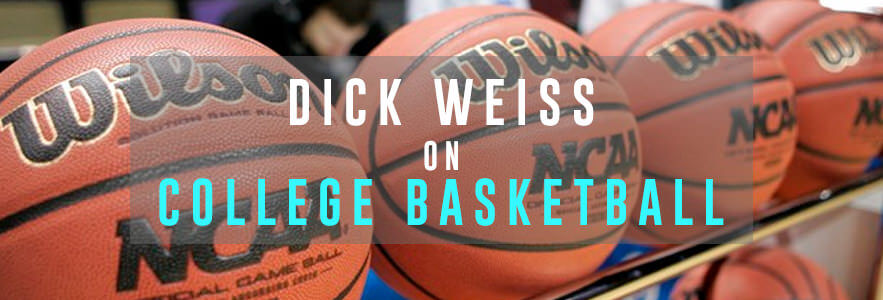WOOLWICH, N.J.– This has been a busy last five days for George Raveling. The 78-year old Nike Director of Global Basketball gave the commencement speech at Villanova last Friday before a sellout crowd at the Pavilion on the Philadelphia Main Line campus and received an honorary Doctor of Letters degree from his alma mater. Then, three days later, he imparted his wisdom to a slightly smaller, but no less enthusiastic audience of the best and brightest students at Kingsway, N.J.Regional High School.
Raveling is one of the most respected minds in the history of modern basketball. He was inducted into the Class of 2015 at the Naismith Basketball Hall of Fame and has also received the John Bunn Lifetime Achievement award from the Hall,
Raveling was a pioneer in the civil rights movement, breaking down racial barriers as a coach during his storied career. He is best known for receiving the original copy of “I Have a Dream” speech from Martin Luther King when he worked security on the podium during the 1963 March on Washington that was attended by 200,000 participants.
Raveling was born in segregated Washington, D.C. He was a three sport star in high school and an outstanding boxer, but he passed on boxing to accept a basketball scholarship to Villanova, where he played for the late Al Severance from 1957-1960. Raveling built a reputation as an extraordinary rebounder, once pulling down a school record 29 in a game. After graduation, he returned to his alma mater as an assistant to Jack Kraft, where he quickly established himself as one of the best recruiters in the country, establishing an underground railroad to Villanova for blue chip African American prospects like Howard Porter from the deep South. He later took a similar position at the University of Maryland, where he became the first African American assistant coach in the Atlantic Coast Conference for a Top 10 program and experienced similar success with the recruiting of Tom McMillan, who was considered the best prospect in the country in 1971.
In 1972, Raveling became the first African American coach in the Pac-Eight when he was hired as head coach at Washington State.He coached the Cougars from 1972 through 1983 and was selected as the league’s Coach of the Year in 1976 and 1983. He went on to coach at Iowa (1983-86) and the University of Southern California (1987-84), coaching his teams to six NCAA appearances and two NIT bids. Raveling was selected as Kodak National Coach of the Year, Basketball Weekly Coach of the Year, Black Coaches’ Association Coach of the Year and CBS/Chevrolet National Coach of the Year before retiring in 1997.
Raveling has been actively involved in the Olympic movement and served as an assistant coach for the U.S. Olympic teams in 1984 and 1988.
After his retirement from coaching, Raveling served briefly as a color commentator for Fox Sports and CBS. He then joined Nike where his current role includes overseeing global basketball marketing and relationships, events and strategies. He personally helped Nike build a strong relationship in China. Raveling has been induced in five other Hall of Fames– Washington State, Villanova, the Commonwealth of Pennsylvania and the College Basketball Hall of Fame in Kansas City and the Black Coaches’ Association. He has published two books, “War on the Boards” and “A Rebounder’s Workshop” and is an accomplished speaker and a former member of the National Speakers Association.
The idea to honor Raveling came from Jeanine Delaney, a teacher in high school’s business leadership academy whose son Tim was a medical red shirt as a freshman on Villanova’s 2016 national championship team. It was a more personalized tribute to a man who has always been a pioneer. The hour long program, a personalized tribute, was organized by Patricia Calandro, the head of the business academy; and produced by Diana Crespo from the theatre department. It included Raveling’s favorite song, “What a Wonderful World” poems, musical performances and this creative rap song dedicated to Raveling that was written by senior P.J. Crescenzo, who will enroll in Rutgers this fall.
. . .
Born to be a leader, meant to be a teacher, inspired an ethic that was the birth of believers.
Started in DC, 1937, built a bridge for a youth to Villanova heaven, but first set his standard as a stud at Hoban Heights, before he went to shine in Nova. blue and white
At the time color was more than a cover, it was the pain and fear hidden in every mother, the fueled to every quarrel in the streets, and the divide between the same empty seat
. . .
The second ever of race to play, at Nova and more, they’ve come such a long way, the meeting of Warren Wilson built a two man team, which led to the two, discovering the dream.
August 29 in 1963, one simple speech the world didn’t know what could be, at the end of King’s words, all he did was ask, because now George Rave has a piece of the past.
He tucked it inside of his book from Harry Truman, and from there civil rights really started its blooming, times began to change, and George Rave began his reign, passing along a virtue that will never be the same.
. . .
From Maryland to Washington, both giving light, from Iowa to USC, a man on his flight, coaching and winning, teaching and praising, one man cherishing the light that needs saving, in a world of animosity, scoured with trepidation, George Rave patiently knew what he was facing.
Of course, he could coach, Olympics with Jordan, but there was a greater message that was much more important. A Joe Lapchick Character Award, for his war against a world that was torn.
Then came the pure ethic he infused into Nike, he was the bull between Mikey and Nike, no aphrodite, now Hal of Fame and a legend of the game, international director giving growth that’s not tamed.
. . .
He still holds the speech that made us all parallel, under the cloud of quality as if under a spell, or pure peace growing deep inside our hearts, Martin Luther King dies but he shines in the dark, and George Rave will hold that key regardless of price, because the greater purpose defined his life.
It’s not the full court press, or the inbound pass, that will define George Rave on his last day. It’s the will to succeed that he tattooed on us all, the fight to climb when your body says fall. I’ve never met George Rave but even as a stranger, from knowing his story he lived as a savior.
. . .
He once said, “Our journey in life is about learning and growing everyday, in every way.”
Thank you George Raveling for leading the way.
. . .
The production put the best face on this South Jersey school. Afterwards, Raveling addressed the students and told them to “dare to dream” and to not put limitations on their goals.
“I still have childhood dreams,” he told them. “I dream of things that never where and ask why not? I dream of making a difference in the lives of thousands of people.
“Dare to be different, to think differently. Believe me, if you can imagine it, you can achieve it. If you can dream it, you can become it. But you have to first feel it. Your mind, your body must be consumed on a daily basis with your dream. .
“Believe in your heart for it offers hope. Believe in your mind because it offers direction. Believe in your soul, because it offers strength. But above all else, believe in yourself. You are the answer. The hand of god opens door for those who truly believe in dreams. Never forget that you are more than what you see in the mirror. You are braver than you believe, stronger than you seem you’re smarter than you think
“Finally plan it. A dream without a deadline is nothing more than a wish. Figure out what you have to do and then do it. It’s never too late to become the person you want to be.
“Every day, no matter how busy you are, do something that brings you closer to your dream. The last thing any of us want to do is is die with our dreams buried within us.”
The Kingsway administration, inspired by Superintendent. Dr. James. J. Lavender and principal Craig Stephenson, have gone out of its way in the past to find diverse role models for the leaders of tomorrow, successful men and women who can speak about their experiences and offer a road map for the future.
Raveling fits into the category perfectly.
Dick Weiss is a sportswriter and columnist who has covered college football and college and professional basketball for the Philadelphia Daily News and the New York Daily News. He has received the Curt Gowdy Award from the Naismith Basketball Hall of Fame and is a member of the national Sportswriters Hall of Fame. He has also co-written several books with Rick Pitino, John Calipari, Dick Vitale and authored a tribute book on Duke coach Mike Krzyzewski.




